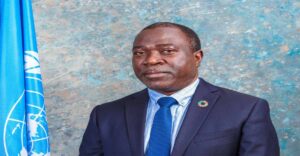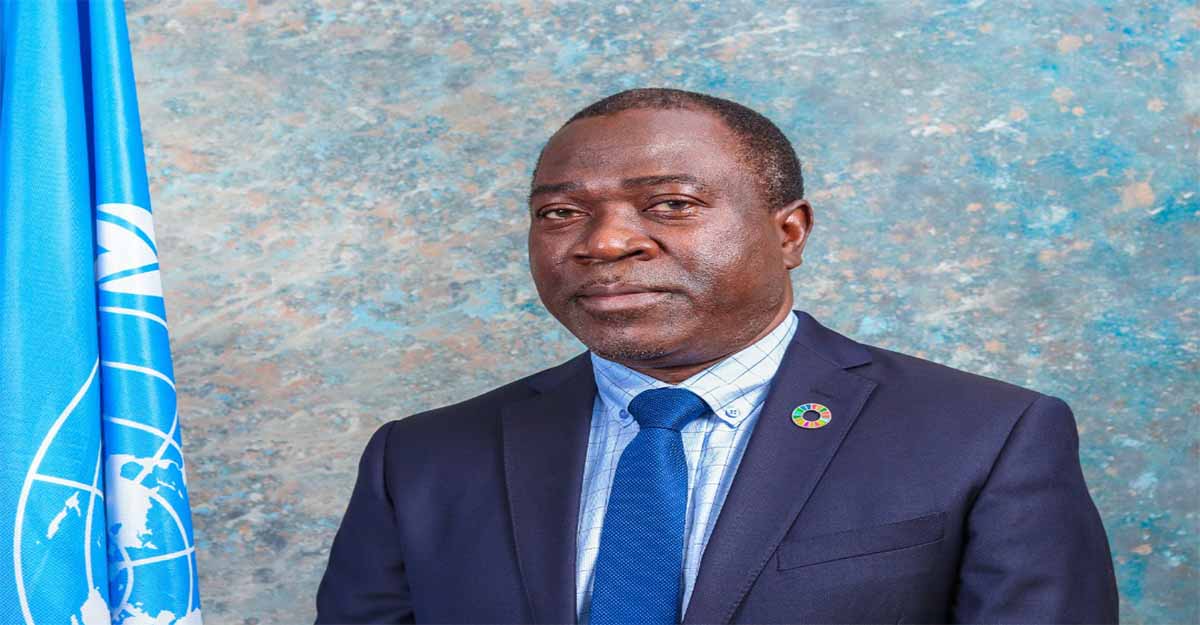
By Babatunde Ahonsi (UN Resident Coordinator in Sierra Leone.)
As challenging as last year was in further knocking developing countries like Sierra Leone off the sustainable development track, due largely to the devastating economic impacts of the Covid-19 pandemic, 2022 promises to be no better. Among a complex of issues that portend a landscape fraught with major challenges in the year ahead, three issues should be of particular concern to leaders and key stakeholders in Sierra Leone.
First, we are witnessing a strong resurgence in Covid-19 transmission around the world (Sierra Leone included). For low-income countries, there is now a high probability of prolonged economic adversities associated with the huge uncertainty around how soon the pandemic will be brought under control.
With the majority of Sierra Leoneans yet to be fully vaccinated and an increasing number of breakthrough infections among the vaccinated and previously infected, the national Covid-19 response needs to be significantly re-engineered around a sustained ‘Do-It-All’ strategy. This must seek to deliver by year-end full vaccination for at least 70 percent of the population and foster broad adherence to Covid-19 prevention protocols around handwashing, face mask-wearing, and safe physical spacing. These are not unrealistic targets given, for example, the availability of significant supplies of vaccines to Sierra Leone. But they can only be achieved through strong, sustained leadership by government as well as unity of purpose and well-coordinated action among all key stakeholders.
We may all be tired of Covid-19 and its impact. But this coronavirus is not yet tired of us. For now, therefore, rather than talk about post-Covid recovery, the focus should be on containing Covid-19 transmission and sustaining inclusive and nature-positive economic growth in the course of doing so. The revamped Covid-19 response should be leveraged to strengthen the health system and the overall health emergency preparedness of the country. In addition, dealing with impact of Covid-19 offers a resetting opportunity for real transformation in economic policy responses towards protecting and improving livelihoods for the teeming population of young people and women in the informal sector, and investing in education, skills development, and infrastructure as the foundation for sustained economic growth and social progress in the years to come.
Second, the long-standing weaknesses in the fundamentals of the national economy are likely to be exacerbated in 2022. The less-than-ideal trends in per capita income, consumer price inflation, foreign direct investment, current account deficit and the debt-to-GDP ratio could potentially worsen. The full impact of persisting Covid-related disruptions to key global supply chains, rising interest rates and liquidity crisis in major economies across the world would most likely be felt in Sierra Leone in terms of a huge fiscal squeeze, and high levels of food insecurity, youth unemployment and multidimensional poverty. Revenue and economic growth forecasts in the 2022 budget and expectations of a more positive macroeconomic outlook in the medium term would probably now have to be adjusted downwards.
In this scenario, government may have no choice but to institute severe austerity measures and to do a lot more to eliminate inefficiencies and gaps in the allocation and management of public finances. Within these economic management efforts however, all hands must be on deck to ensure the ring-fencing of funding for key priorities around education, livelihoods protection, and health which are key to ensuring social stability and speedy return to the path of economic recovery.
Third, the way politics is played in 2022 really matters. What Sierra Leone’s key political actors do this year will determine whether the country successfully holds elections in 2023 in a manner that helps to advance the process of democratic consolidation in the ensuing years. The signals from 2021 were not too encouraging as we saw more evidence of tit-for-tat than give-and-take politics across the landscape to the detriment of accelerated pursuit of the nation’s development priorities. We saw an unmistakable rise in political tensions in the land and louder expressions of anxieties about the democratic health of the country. These tendencies would need to be reversed in 2022 to lay the foundation for an enabling environment for peaceful and credible elections in 2023.
Protagonists across political divides and political leaders of all shades at the national, regional, district, and community levels must always remember that two wrongs do not make a right and an eye for an eye leaves both parties blind. They must be ever conscious of the fact that conflict prevention is always far better than peacebuilding. Therefore, a recommitment to genuine dialogue between the leaders of the ruling party and the main opposition parties to address unresolved political grievances in a mutually satisfactory way before the end of 2022 is an absolute necessity.
The country needs more than ever before to return to the path of inclusive politics that builds bridges across ethnic, regional, gender, generational, and disability status divides. In a country like Sierra Leone, political parties cannot continue to merely function as vehicles for winning elections. They must also serve as major contributors to the shaping of socioeconomic policies and governance processes so as to deliver enhanced life chances to all citizens as dividends of democracy. Continued failure to do so will only serve to weaken public trust in democracy and state institutions.
The three challenges highlighted above are clearly interconnected vis-à-vis the social contract between citizens and their leaders. They require that leaders across all spectrum of Sierra Leonean society begin to demonstrate a commitment to putting Sierra Leone first that matches the urgency of the threats that they pose to the country’s sustainable peace and development.
On our part, the UN country team will continue to work with other development partners to support the efforts of government, civil society organizations, the private sector, and other stakeholders in mitigating the socio-economic impact of Covid-19, advancing sustainable food and nutrition security, and expanding access to basic services for vulnerable populations. We will ensure that all our development efforts put the furthest behind first especially disadvantaged women, young people, and persons living with disabilities. The UN will also work with key stakeholders to directly support efforts to foster peaceful, credible, and inclusive elections in 2023.
In all of this, we hope the leaders and citizens of Sierra Leone will find inspiration in the following extracts from the 2022 New Year Message of UN Secretary General, Antonio Guterres:
Moments of great difficulty are also moments of great opportunity.
To come together in solidarity.
To unite behind solutions that can benefit all people.
And to move forward — together — with hope in what our human family can accomplish.
On this hopeful note, may I on behalf of the UN country team, wish all Sierra Leoneans a 2022 that is better than 2021. In doing so, and with words from the National Pledge, it is my fervent hope that all Sierra Leoneans will work for the country’s unity, peace, freedom, and prosperity, and put her interest above all else throughout 2022.








